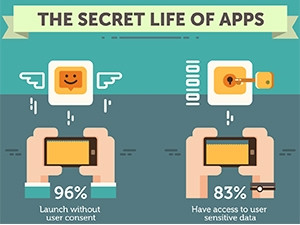
The rapid growth in the use of applications has significantly added to the digital clutter that exists on people's digital devices, and poor maintenance of these apps is leaving many devices vulnerable to security threats.
This is according to a report by Kaspersky Lab, "Digital Clutter and Its Dangers", which reveals the scale of the digital clutter problem among global Internet users.
The study found users typically install 12 Android apps every month but delete only 10, in effect adding two apps to their device on a monthly basis. With more apps installed on devices, managing apps is important in preventing digital clutter, it says.
The study is based on insight gained from an online survey across 17 countries, which assessed the attitudes of 16 250 Android users aged over 16 years. The data was weighted to be globally representative and consistent, and split equally between men and women, according to Kaspersky.
"In only half (55%) of cases, users regularly refresh and revise the contents of their device and delete unused docs and apps. In a quarter of cases (28%), users only update apps on their devices when they are forced to, and in 10% of cases they try not to do it at all. The build-up of digital clutter means app cleansing and updating are now more important than ever in order to combat malware that use apps' vulnerabilities to penetrate devices," notes the research.
Further findings reveal that out of 100 Android apps, 83 have access to sensitive user data, such as contacts, messages and data, and some apps can even make calls and send SMSes without user permission.
Andrei Mochola, head of consumer business at Kaspersky Lab, says: "Users are exposing devices and personal data to security threats by failing to undertake simple but essential care for their device that cleans and updates software and apps, adjusts settings, and uninstalls apps that are no longer used. The build-up of digital clutter on our devices means that we increasingly overlook the maintenance of these apps.
"But we do so at our peril because this can lead to a wide range of problems such as device glitches, battery life issues or malware infection. Apps have access to some of the most sensitive and personal data we have on our devices and users are often unaware this information is being shared. We urge users to put their digital houses in order. Just like a clean, uncluttered room breathes fresh energy into your home and life, in the same way, an uncluttered computer or smartphone results in a more enjoyable, and a safer experience."
Additional findings from the report show that on average users have 66 apps on their Android device. When a representative sample of 66 of the most popular Android apps were tested, 54 launched in the background without users even touching them, consuming, on average, 22Mb traffic per day without any user interaction.
App settings give users a degree of control over what the app can access and interact with on the device. However, the survey found only 40% of people intentionally adjust the settings of each application on their smartphone. Furthermore, only 32% can refuse to install a mobile app if they are not satisfied with the content of licence agreements.
According to a study of 640 businesses by the Ponemon Institute, conducted on behalf of IBM, an average company tests less than half of the mobile apps they build, and 33% never test their apps for security before they go on the market. This disparity could potentially expose users to sophisticated cyber attacks, which could enable hackers to gain access to the vaults of corporate and personal data living on mobile devices, adds the report.
In order to combat the clutter and protect personal data, Kaspersky advises users to 'spring clean' their devices, undertake regular app and software updates, and use reliable software cleaners to scan all applications installed on devices.
Share